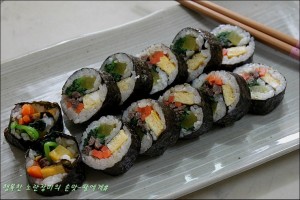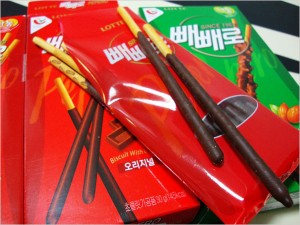Informant is a Korean international student at USC, majoring in accounting. She is 21 years old, and has lived in Korea until she finished high school. Her primary language is Korean. Her family consists of five members –her mom, her dad, younger brother, younger sister, and herself.
Superstition: Do not eat the ends of kimbab. If you do, you will be the bottom of the class.
“Whenever I ate kimbab with my mom, she claimed the ends of kimbab as hers. What she said was that if I eat the ends, than I will be the bottom of my class. I remember her saying this in a joking way, but she still took the ends of kimbab. I don’t think I truly believed eating the ends would make me the bottom, but I just avoided eating it as possible. No one wants to be the bottom, right? I mean, just in case. There was this strange feeling that I would really place the bottom if I eat the ends. My mom said she learned this from Grandma, who told her the same thing. When my mom was young, she always saw Grandma eating the ends before she did.
“I have this memory back in middle school. I went to eat with my friends, and we ordered kimbab. When kimbab came out, I jokingly said how eating the ends would make someone be the bottom of the class. I expected my friends to relate to this superstition, but somehow it was only me and this other friend who knew about it. It was so weird. Most of my friends have been confidently eating the ends of kimbab. That was never me. I just avoided the ends as possible, intentionally and unintentionally. I think there was no time I ever saw the ends of kimbab without being reminded of this superstition. I guess that thought got instilled in me. Now, I eat the ends of kimbab without any worries. Funny thing is that the ends are actually more delicious than other parts. I like eating them, but I am still reminded of it.
“I think my family followed this superstition because my family, historically, have been closely tied to education. My mom is a doctor and you couldn’t see many female doctors back in her time. Grandpa was a general. I feel like the importance of education in my family has made our family to believe in such superstition. I might tell my children about this superstition and finish off the ends of kimbab before they do. Haha.”
The informant’s family believed in the superstition that eating the ends of kimbab, a Korean traditional food, would make one be at the bottom of class. As the informant described, I also think this superstition is closely tied to Confucius beliefs. Korea, which is heavily influenced by Confucianism, places great importance on children’s education. Parent’s want for children to excel in education naturally created this superstition, which avoids anything resembles ‘the end.’


